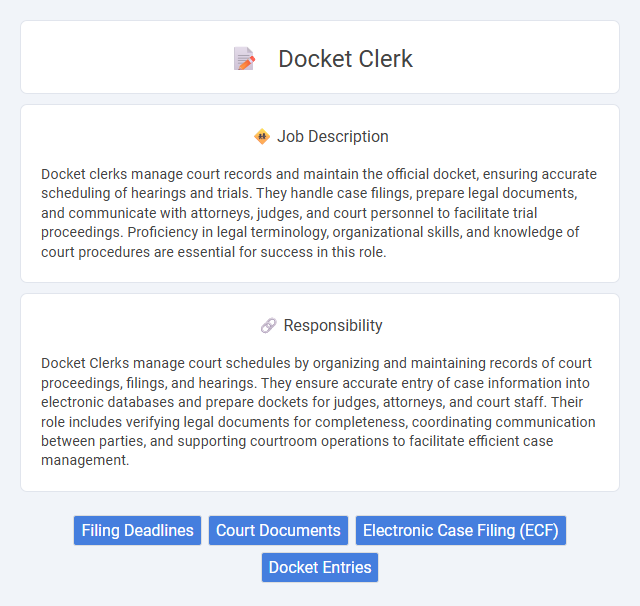
Docket clerks manage court records and maintain the official docket, ensuring accurate scheduling of hearings and trials. They handle case filings, prepare legal documents, and communicate with attorneys, judges, and court personnel to facilitate trial proceedings. Proficiency in legal terminology, organizational skills, and knowledge of court procedures are essential for success in this role.
People who are detail-oriented with strong organizational skills will likely be suitable for a Docket Clerk job, as this role requires maintaining accurate records and managing legal documents. Individuals who handle repetitive tasks well and can work efficiently under deadlines may find this position aligned with their strengths. Those who prefer dynamic interactions or high-stress environments might not be as compatible with the routine and focused nature of docket clerking.
Qualification
Docket Clerks require a high school diploma or equivalent, with preference given to candidates possessing an associate degree in legal studies or a related field. Proficiency in legal terminology, record-keeping software, and strong organizational skills are essential for managing court documents accurately. Experience in a legal or administrative role enhances a candidate's ability to handle docket entries, scheduling, and case file management efficiently.
Responsibility
Docket Clerks manage court schedules by organizing and maintaining records of court proceedings, filings, and hearings. They ensure accurate entry of case information into electronic databases and prepare dockets for judges, attorneys, and court staff. Their role includes verifying legal documents for completeness, coordinating communication between parties, and supporting courtroom operations to facilitate efficient case management.
Benefit
A Docket Clerk position likely offers benefits such as a stable work schedule and opportunities for skill development in legal documentation management. Employees may gain valuable experience in court procedures and administrative processes, enhancing career prospects in the legal field. Access to healthcare and retirement plans could be common perks associated with this role depending on the employer.
Challenge
Handling the fast-paced environment of a docket clerk job likely presents considerable challenges due to the constant need for accuracy and timeliness in managing court records. The probability of encountering complex scheduling conflicts or urgent legal updates may require quick problem-solving skills and adaptability. Meeting these demands consistently might test one's organizational abilities and attention to detail under pressure.
Career Advancement
Docket clerks gain valuable experience in legal document management, court procedures, and case tracking, which serves as a strong foundation for career advancement within the judicial or legal administrative field. Proficiency in legal software and gaining a thorough understanding of court operations can lead to promotions such as court clerk, legal assistant, or paralegal roles. Continued education and certification in legal studies or court administration significantly enhance opportunities for upward mobility and specialization.
Key Terms
Filing Deadlines
Docket Clerks play a critical role in managing filing deadlines by accurately tracking court dates and ensuring timely submission of legal documents. They utilize case management software to monitor deadlines and notify attorneys of upcoming court requirements, reducing the risk of missed filings. Precise attention to filing deadlines maintained by Docket Clerks directly supports efficient legal proceedings and compliance with judicial mandates.
Court Documents
Docket Clerks play a crucial role in managing court documents by accurately recording, organizing, and maintaining case files and legal paperwork. They ensure all filings, motions, and court orders are logged into the docket system promptly to facilitate efficient case tracking. Proficiency in legal terminology and document management software is essential for maintaining the integrity and accessibility of court records.
Electronic Case Filing (ECF)
Docket Clerks proficient in Electronic Case Filing (ECF) ensure accurate and timely entry of legal documents into digital court systems, facilitating efficient case management. Mastery of ECF software enables seamless uploading, docketing, and tracking of pleadings, motions, and orders, reducing paper-based errors and improving accessibility for judges and attorneys. Expertise in ECF protocols also supports compliance with court rules and enhances overall workflow within federal and state judicial environments.
Docket Entries
A Docket Clerk is responsible for accurately entering and managing docket entries in the court's electronic filing system. They ensure that all case documents, motions, and orders are recorded with precise dates, case numbers, and relevant details to maintain an organized and accessible court record. Expertise in legal terminology and attention to detail are essential to prevent errors in case management and support judicial efficiency.
 kuljobs.com
kuljobs.com